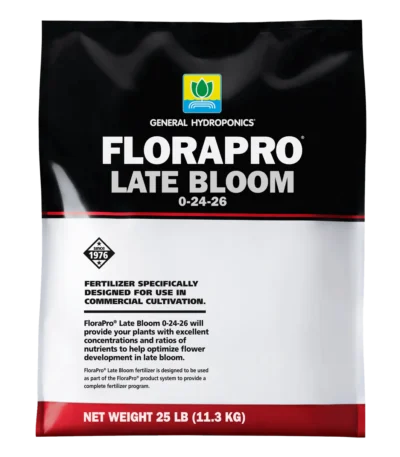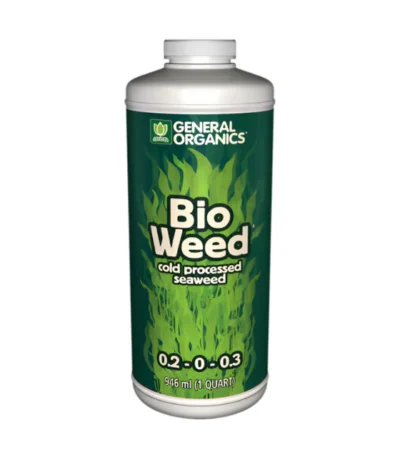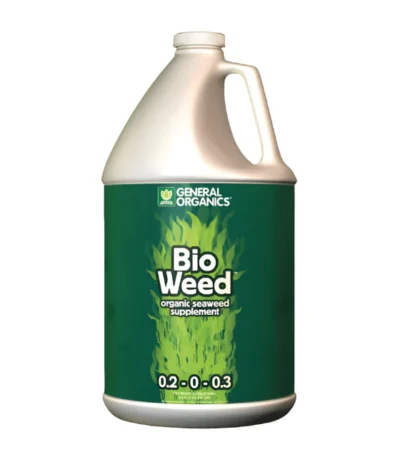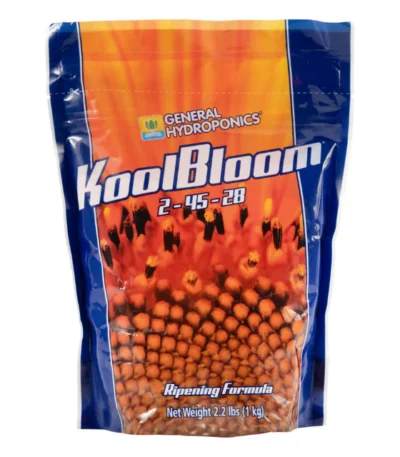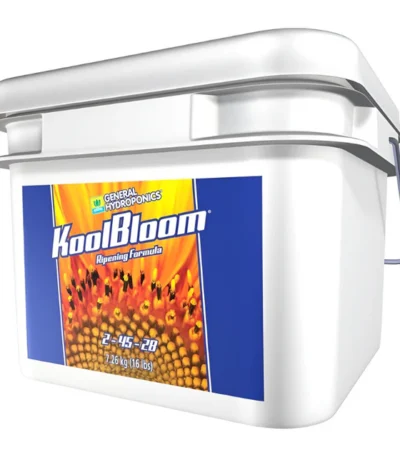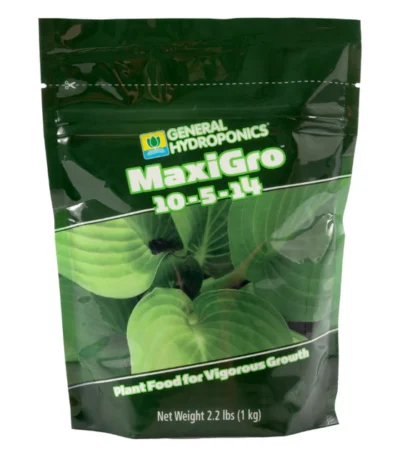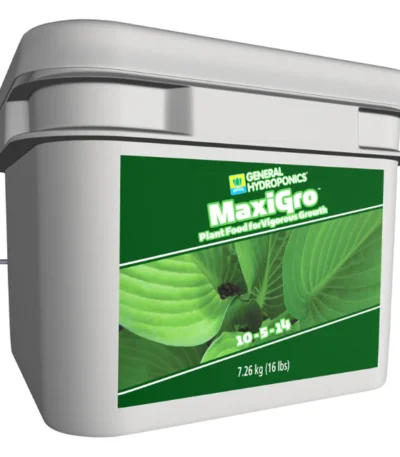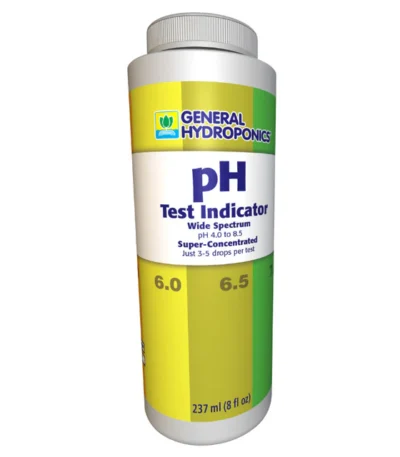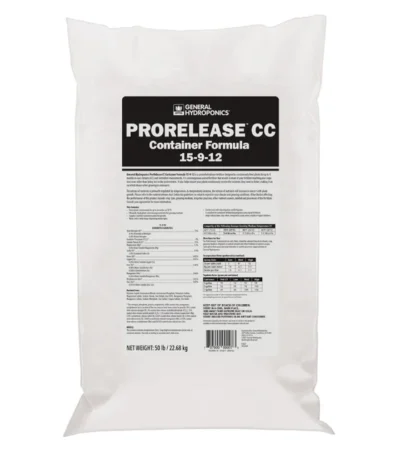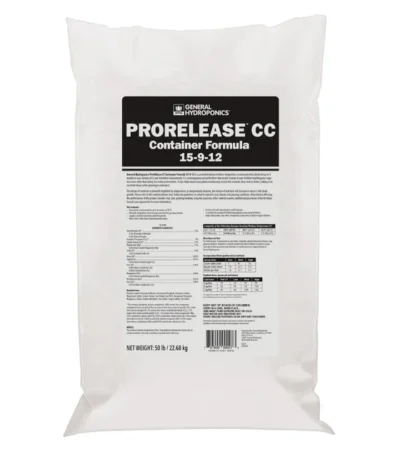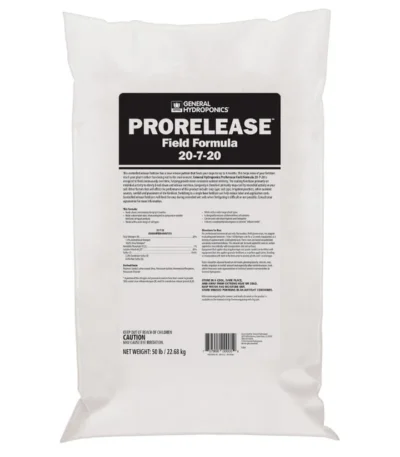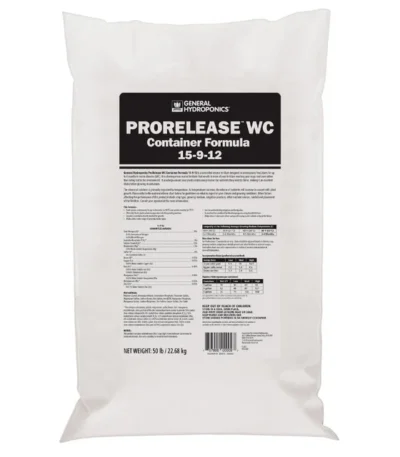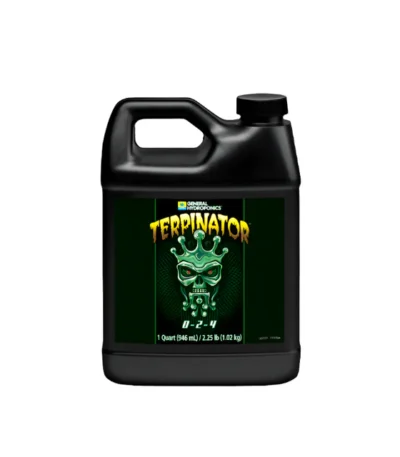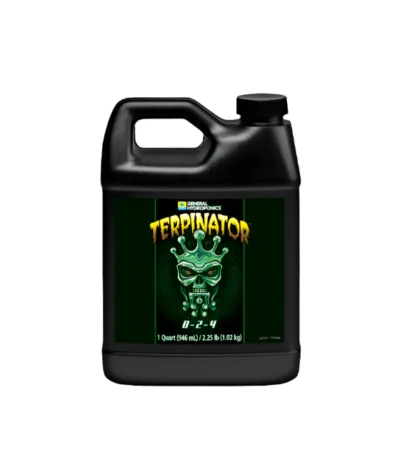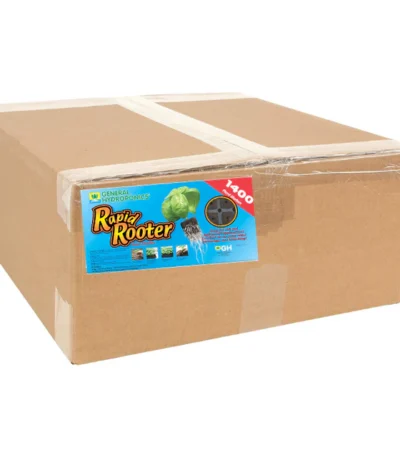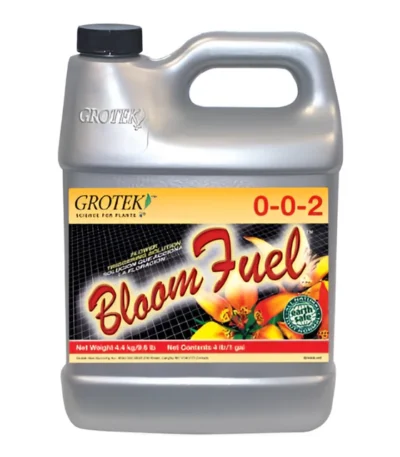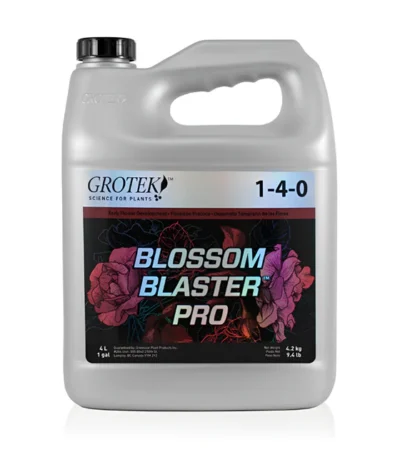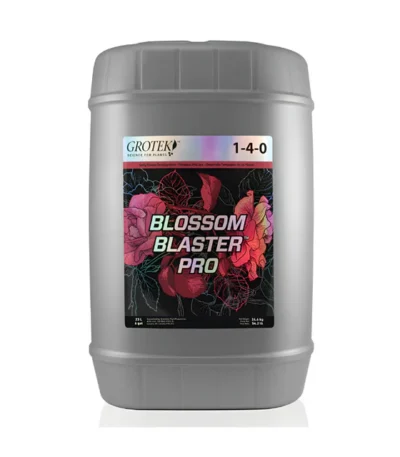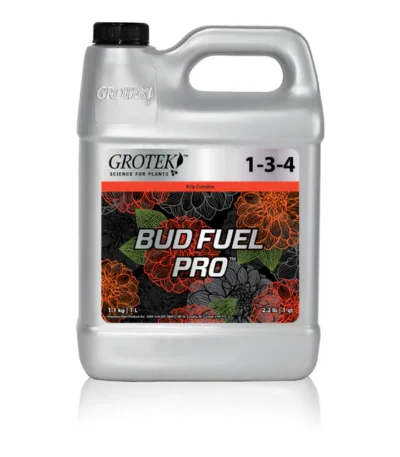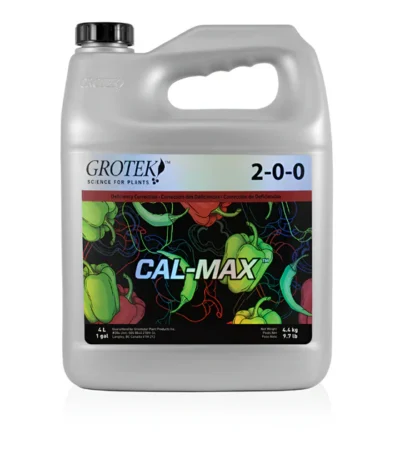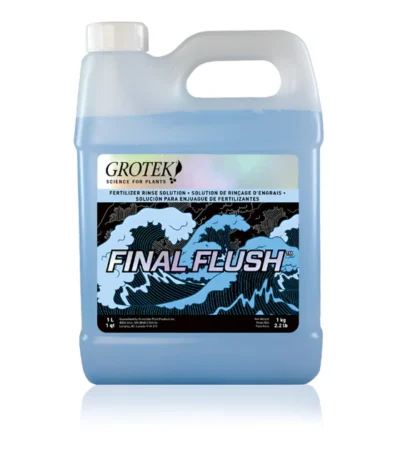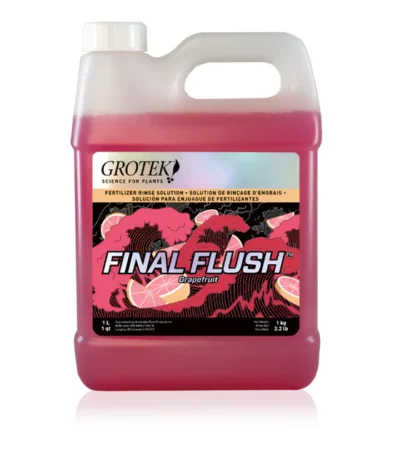Filter by price
Stock status
Showing 101–120 of 151 results
General Hydroponics FloraPro Late Bloom 25Ibs
$71.00FloraPro™ Late Bloom is part of the FloraPro nutrient system. It can be used in combination with FloraPro Bloom or as a replacement for FloraPro Bloom based on your plant’s nitrogen needs. Our unique formulations and methodologies help to produce superior results in large-scale operations. Designed from the ground up for fertilizer injection systems, FloraPro™ is easy to use and highly water-soluble. Our complete and balanced formula is cost-effective, scalable, and consistent to meet the high standards of a competitive industry.
FloraPro™ Late Bloom is a zero nitrogen bud finishing product with high potassium and magnesium sulfate to encourage prolific flower development and allow growers more versatility to be able to fade nitrogen during the bloom phase.
General Hydroponics General Organics BioWeed
$55.60 – $257.90Price range: $55.60 through $257.90BioWeed is a plant and soil vitality booster
Featuring a natural blend of cold processed seaweed that encourage thriving growth of roots, stem, and foliage
BioWeed works in harmony with General Organics BioThrive Grow fertilizer
Each product in the “GO” line enables you to enrich your garden, your life, and the planet
General Organics foundation rests upon a deep commitment to provide simple, sustainable and innovative products with unsurpassed quality
Free 2DAY EXPRESS shipping for Quart sizes
Free Standard shipping for other sizes
General Hydroponics KoolBloom
$22.70 – $115.00Price range: $22.70 through $115.00KoolBloom® is a highly concentrated nutrient supplement that promotes abundant flowering and facilitates ripening in annual flowers and herbs. KoolBloom® is rich with phosphorus and potassium and contains precise amounts of ripening elements. KoolBloom® is to be used only at the very end of a plant’s life cycle and will help build larger, heavier fruits and flowers.
Free 2DAY EXPRESS shipping for 2.2lbs
Free Standard shipping for 16lbs
General Hydroponics MaxiGro
$15.50 – $205.00Price range: $15.50 through $205.00MaxiGro™ and MaxiBloom™ are extremely potent, stand-alone, water-soluble, dry concentrate nutrients. Complete in primary, secondary and micronutrients, pH buffered MaxiGro™ and MaxiBloom™ will provide superior results when used with a wide variety of crops in both hydroponic and soil-based environments. MaxiGro™ encourages growth of seedlings, cuttings and stimulates rapid growth through the vegetative growth stage.
Free 2DAY EXPRESS shipping for 2.2lbs
Free Standard shipping for 16lbs & 50lbs
General Hydroponics pH 4.01 Calibration Solution 1quart
$23.07General Hydroponics™ uses the highest-quality reference solutions, allowing growers to calibrate many popular brands of PH, EC and TDS meters (NaCl scale or the 442 scale). General Hydroponics™ technicians check each batch to ensure that our solutions are precisely calibrated and yield reliable readings each time they are used.
Free 2DAY EXPRESS shipping
General Hydroponics pH 7.01 Calibration Solution 1quart
$23.07General Hydroponics™ uses the highest-quality reference solutions, allowing growers to calibrate many popular brands of PH, EC and TDS meters (NaCl scale or the 442 scale). General Hydroponics™ technicians check each batch to ensure that our solutions are precisely calibrated and yield reliable readings each time they are used.
Free 2DAY EXPRESS shipping
General Hydroponics pH Test Indicator 8oz
$17.57General Hydroponics pH Test Kits make pH testing easy. Simply fill a test-tube halfway with nutrient, add a few drops of pH Test Indicator and observe the coloration of the liquid in the test vial. Many experienced growers prefer our pH Test Kit to expensive electronic meters because of its reliability and ease of use, which are important factors when the health of a valuable crop is at stake. Use 3 drops per 5ml of solution.
General Hydroponics ProRelease Cool Climate Container Formula 50 Ib
$95.00Desingned for Cooler Climates (CC) the General Hydroponics ProRelease Container Fertilizers are 100% coated granulated fertilizers. Designed for high value crops like cannabis, hemp and other aromatherapeutic herbs grown in containers, raised beds or fabric grow pots. Incorporate or apply at transplant and watch your crops thrive. Feeds for up to 4 months*. *will vary based on soil needs, planting density, climate, crop, media, irrigation or rainfall amount and especially other nutrient usages.*
General Hydroponics ProRelease Cool Climate Container Formula 50 Ib
$97.40Desingned for Cooler Climates (CC) the General Hydroponics ProRelease Container Fertilizers are 100% coated granulated fertilizers. Designed for high value crops like cannabis, hemp and other aromatherapeutic herbs grown in containers, raised beds or fabric grow pots. Incorporate or apply at transplant and watch your crops thrive. Feeds for up to 4 months*. *will vary based on soil needs, planting density, climate, crop, media, irrigation or rainfall amount and especially other nutrient usages.*
General Hydroponics ProRelease Field Formula 50 Ib
$45.00General Hydroponics ProRelease Field Formula 20-7-20 is a blend of coated and uncoated granulated fertilizers designed for high value field grown crops like hemp and other aromatherapeutic herbs. Apply at the start of your season and watch your crops thrive. Feeds for up to 4 months*. *will vary based on soil needs, planting density, climate, crop, media, irrigation or rainfall amount and especially other nutrient usages.
General Hydroponics ProRelease Warmer Climate Contain Formula 50 Ib
$95.00Desingned for Warmer Climates (WC) the General Hydroponics ProRelease Container Fertilizers are 100% coated granulated fertilizers. Designed for high value crops like cannabis, hemp and other aromatherapeutic herbs grown in containers, raised beds or fabric grow pots. Incorporate or apply at transplant and watch your crops thrive. Feeds for up to 4 months*. *will vary based on soil needs, planting density, climate, crop, media, irrigation or rainfall amount and especially other nutrient usages.*
General Hydroponics Terpinator
$20.37 – $191.30Price range: $20.37 through $191.30Terpinator was created from years of researching naturally occurring plant compounds that are bio-osmotic potentiators. Through our patented scientific process, your plants will utilize these compounds to enhance their production of terpinoids and plant oil producing glands. These glands are brought to their maximum potential and size using Terpinator along with any nutrient program.
GH Rapid Rooter Bulk Plugs 1400/Cs
$297.50Rapid Rooter® plugs are all-natural soilless grow plugs made of composted tree bark and organic materials. These plugs are perfect for seedlings or cuttings. Transplant plugs in soil or soilless hydrogardening applications.
Grotek Bloom Fuel
$15.90 – $45.00Price range: $15.90 through $45.00Bloom Fuel represents an entirely new method of feeding aimed at pushing plants into the flowering stage. This exciting, new 100% organic transition product is designed to cut down on the vegetative stage of growth and “switch” the plants over to the flowering stage. As the plant switches stages, Bloom Fuel can help create multiple flower sites with more lateral branching by providing just the right balance of energy nutrients. Begin adding Bloom Fuel 7-10 days prior to the flowering stage to encourage a flowering response. Continue to use throughout flowering. Stop using 1-2 weeks before harvest. Must be used in conjunction with your regular feeding program (preferably a flower feeding nutrient).
GroTek Blossom Blaster
Blossom Blaster™ provides available phosphorous to improve root development and aid in blooming and fruiting. Potassium is instrumental in moving sugars produced by photosynthesis. This powerful flowering supplement should be added twice during the initial 3 weeks of flowering. Blossom Blaster™ is effective in all growing mediums and is compatible with all base nutrients.
A concentrated formula that provides abundant nutrients for rapidly developing flowering sites. This formula uses high-grade ingredients to support flowering plants. Blossom Blaster™ is designed to provide the nutrients necessary to support prolific flowering and bud filling for high quality yields.
Do not use as a foliar spray. Always use fresh product. Do not add to existing solutions.
GroTek Blossom Blaster Pro
$58.00 – $240.00Price range: $58.00 through $240.00Grotek Blossom Blaster Pro Liquid, 4 L and 23 L sizes. Formulated to support profuse blooms and flower production, this concentrated formula requires a low application rate to achieve a high impact on young flower buds. Through a unique phosphorus nutrient complex, this product optimizes conditions for improved fruit and yields
Grotek Bud Fuel Pro 4L
Bud Fuel Pro 4L, This formula optimizes soil nutrient conditions for improved flower development and root structure. By ensuring nutrient availability, Bud Fuel Pro™ provides the foundation for abundant blooms. Using during pre-flower and through early bloom development can encourage prolific blooming for all flowering and fruiting plants.
GroTek Cal-Max 4L
$30.00During periods of high temperatures and accelerated growth, plants can develop nutrient deficiencies, which are preventable. Cal-Max™ was developed to provide the additional calcium, magnesium and iron needed to support peak production.
Applied as a foliar spray, this product can help even in environments where nutrient translocation from roots to leaves is difficult or not occurring at all. Cal-Max™ can be used to treat nutrient deficiency problems when they surface. It can also be used as a preventative supplement in your nutrient program to avoid nutrient deficiency related problems such as tip burn in lettuce and blossom end rot in tomatoes.
Grotek Final Flush 4L
$23.00The Final Flush eliminates excess fertilizer salts in the final stages of growth and can also be used to correct overfeeding or for desalinization of reusable growing media.
Grotek Final Flush Grapefruit 4L
$25.00inal Flush™ is a flushing agent designed to correct overfeeding issues during crop production and also eliminate excess salts from the medium during the final stages of plant growth. Salinity can become a serious issue for those gardeners growing in containers and recirculation systems. Salt buildup can cause problems for growing plants and bitterness in harvested fruit.
The organic acids in this product help knock nutrients out from around the rhizosphere. Removing these easily accessible food sources causes the plant to search for new food sources.
In many cases, plants have tucked away unconverted salts into surrounding tissues. This can lead to bitter-tasting produce. As the medium EC and nutrient availability is lowered, the plant takes any unconverted salts within its structure and properly metabolizes them which results in a cleaner harvest.
Our Online Nutrition and Natural Fertilizers For Plants.
Organic fertilizers are natural substances derived from plant, animal, or mineral sources that enrich the soil and promote healthy plant growth. Unlike synthetic fertilizers, they improve soil structure, enhance microbial activity, and release nutrients slowly over time.
🌿 Common Types of Organic Fertilizers
• Compost: Decomposed organic matter like kitchen scraps and garden waste. Rich in nutrients and beneficial microbes.
• Manure: Animal waste (cow, poultry, goat) that adds nitrogen, phosphorus, and potassium to the soil.
• Bone Meal: Ground animal bones, high in phosphorus and calcium—great for root development.
• Blood Meal: Dried animal blood, a potent source of nitrogen for leafy growth.
• Seaweed Extracts: Packed with trace minerals and growth hormones that stimulate plant resilience.
• Green Manure: Cover crops like legumes grown and plowed back into the soil to boost fertility.
🌍 Benefits of Organic Fertilizers
• Eco-Friendly: Reduces chemical runoff and pollution.
• Improves Soil Health: Enhances structure, aeration, and water retention.
• Supports Biodiversity: Encourages beneficial organisms like earthworms and microbes.
• Sustainable: Utilizes waste materials and promotes circular farming practices.
• Safe for Humans and Animals: No harmful residues or toxins.
⚖️ Organic vs. Chemical Fertilizers
🌾 How to Use Organic Fertilizers Effectively
• Know Your Soil: Test for nutrient deficiencies before application.
• Choose the Right Type: Match fertilizer to crop needs (e.g., nitrogen for leafy greens).
• Apply at the Right Time: Preferably before planting or during early growth stages.
• Mix and Rotate: Combine different organic sources for balanced nutrition.
💡 Final Thoughts
Organic fertilizers are more than just plant food—they’re a commitment to sustainable agriculture, healthier ecosystems, and safer food. Whether you're a backyard gardener or a large-scale farmer, embracing organic fertilization is a step toward a greener future.







